Search the Special Collections and Archives Portal
Search Results
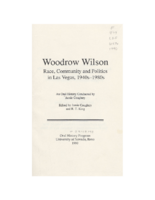
Transcript of interview with Woodrow Wilson by Jamie Coughtry, 1989
Date
Description
Interview with Woodrow Wilson conducted by Jamie Coughtry in 1989. Born in a Mississippi sawmill town in 1915 to a family that ran a boarding house, Wilson completed high school at a private boarding school and attended two years of junior college before the declining economy forced him into the Civilian Conservation Corps to work as a cook and baker. Migrating west in 1940, Wilson soon settled in Las Vegas, Nevada, where he worked for Basic Magnesium, Inc. He became a prominent Westside community activist, founding a federal credit union and serving as president of the Las Vegas NAACP. Wilson worked for over thirty years as a warehouseman for companies that occupied the Basic Magnesium site. In 1966, he was elected to the state assembly, becoming the first black legislator in the history of Nevada, advocating open housing legislation, anti-discrimination regulations, welfare reform, and civil rights.
Text
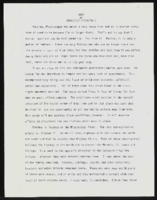
"Hark": article draft by Roosevelt Fitzgerald
Date
Archival Collection
Description
From the Roosevelt Fitzgerald Professional Papers (MS-01082) -- Drafts for the Las Vegas Sentinel Voice file. The author's memories of Natchez, Mississippi Christmas decades past.
Text
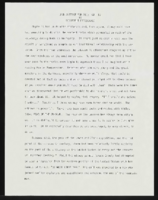
"And Justice for All: Part IV": article draft by Roosevelt Fitzgerald
Date
Archival Collection
Description
From the Roosevelt Fitzgerald Professional Papers (MS-01082) -- Drafts for the Las Vegas Sentinel Voice file. On the mistreatment/discrimination of Chinese Americans.
Text
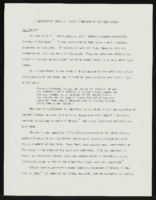
"A Demographic Impact of Basic Magnesium of Southern Nevada": manuscript draft by Roosevelt Fitzgerald
Date
Archival Collection
Description
From the Roosevelt Fitzgerald Professional Papers (MS-01082) -- Unpublished manuscripts file.
Text
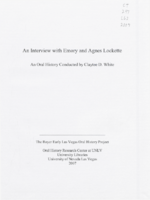
Transcript of interview with Emory and Agnes Lockette by Claytee D. White, March 11, 2005
Date
Archival Collection
Description
Interview with Emory and Agnes Lockette conducted by Claytee D. White on March 11, 2005. The Lockettes were the only African Americans to live in Boulder City during years of racial tension. Agnes taught kindergarten at Westside School, while Emory worked for the Bureau of Reclamation.
Text
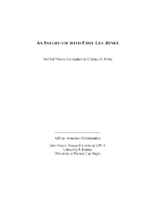
Transcript from interview with Essie Lee Jones by Claytee White, June 5, 1996
Date
Archival Collection
Description
Essie Lee Jones moved from the Tallulah, Louisiana, area to Las Vegas in 1969. In the interview, Jones discusses her employment in various positions such as maid, waitress, and casino porter at the Stardust, Frontier, and Aladdin Hotel/Casinos.
Text
Audio clip from interview with Hermina Washington, March 2, 2013
Date
Archival Collection
Description
In this clip, Hermina describes her family roots and early schooling in Las Vegas.
Sound
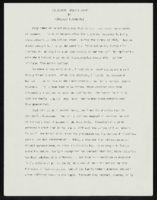
"Collecting Family History": article draft by Roosevelt Fitzgerald
Date
Archival Collection
Description
From the Roosevelt Fitzgerald Professional Papers (MS-01082) -- Drafts for the Las Vegas Sentinel Voice file. On Black families in the United States and family reunions.
Text
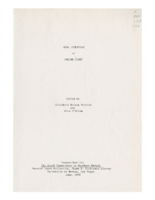
Transcript of interview with Arlone Scott by Glen Ette Davis, July 3, 1975
Date
Archival Collection
Description
Interview with Arlone Scott conducted by Glen Ette Davis on July 3, 1975. Born in Louisiana, Scott moved to Las Vegas in 1951, eventually becoming a hotel maid supervisor. She shares her early experiences of positive race relations among churches in Las Vegas and notes that the Culinary Union improved job opportunities for minorities. Scott concludes with comments on the effects of discrimination and segregation on entertainment and recreation for blacks.
Text
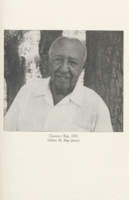
Transcript of interview with Clarence Ray by Jamie Coughtry, 1991
Date
Description
Interview with Clarence Ray conducted by Jaime Coughtry in 1991. Having arrived in Las Vegas in the 1920s, Ray provides a rare perspective on shifts in race relations over the years. He shares stories of early businesses and efforts at organization within the black community. From his arrival, Ray worked to secure equal opportunity and civil rights legislation. During the 1960s, he served two terms as president of the Voters League, formed in 1928 to increase black voting power.
Text
